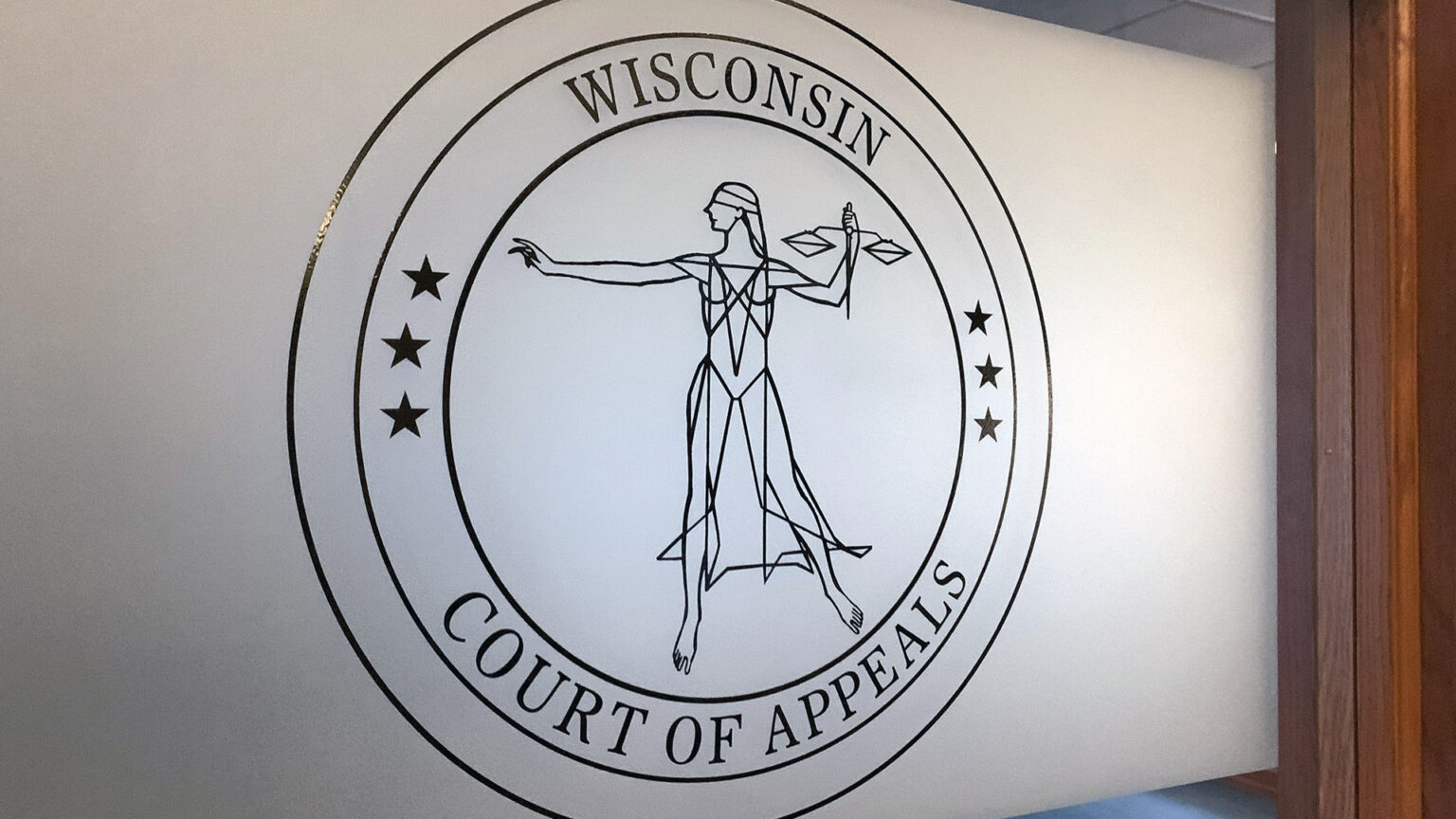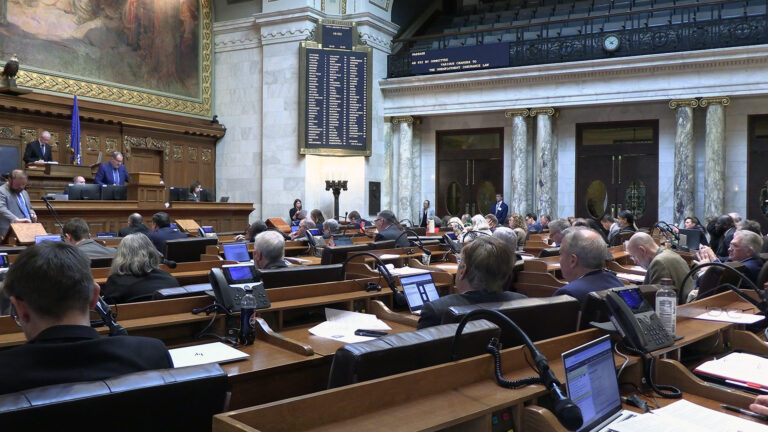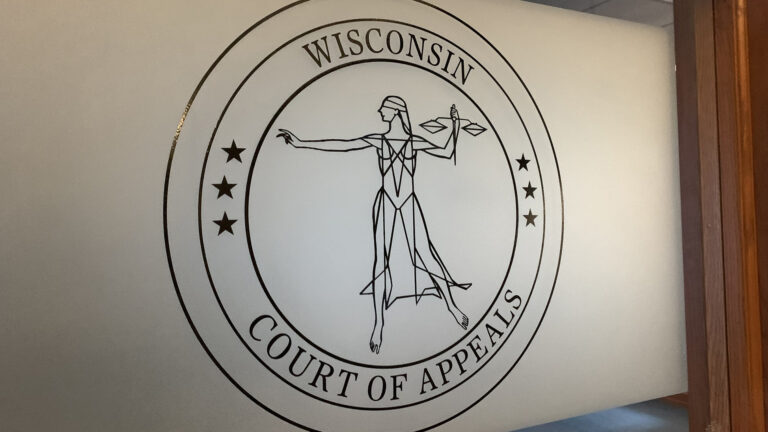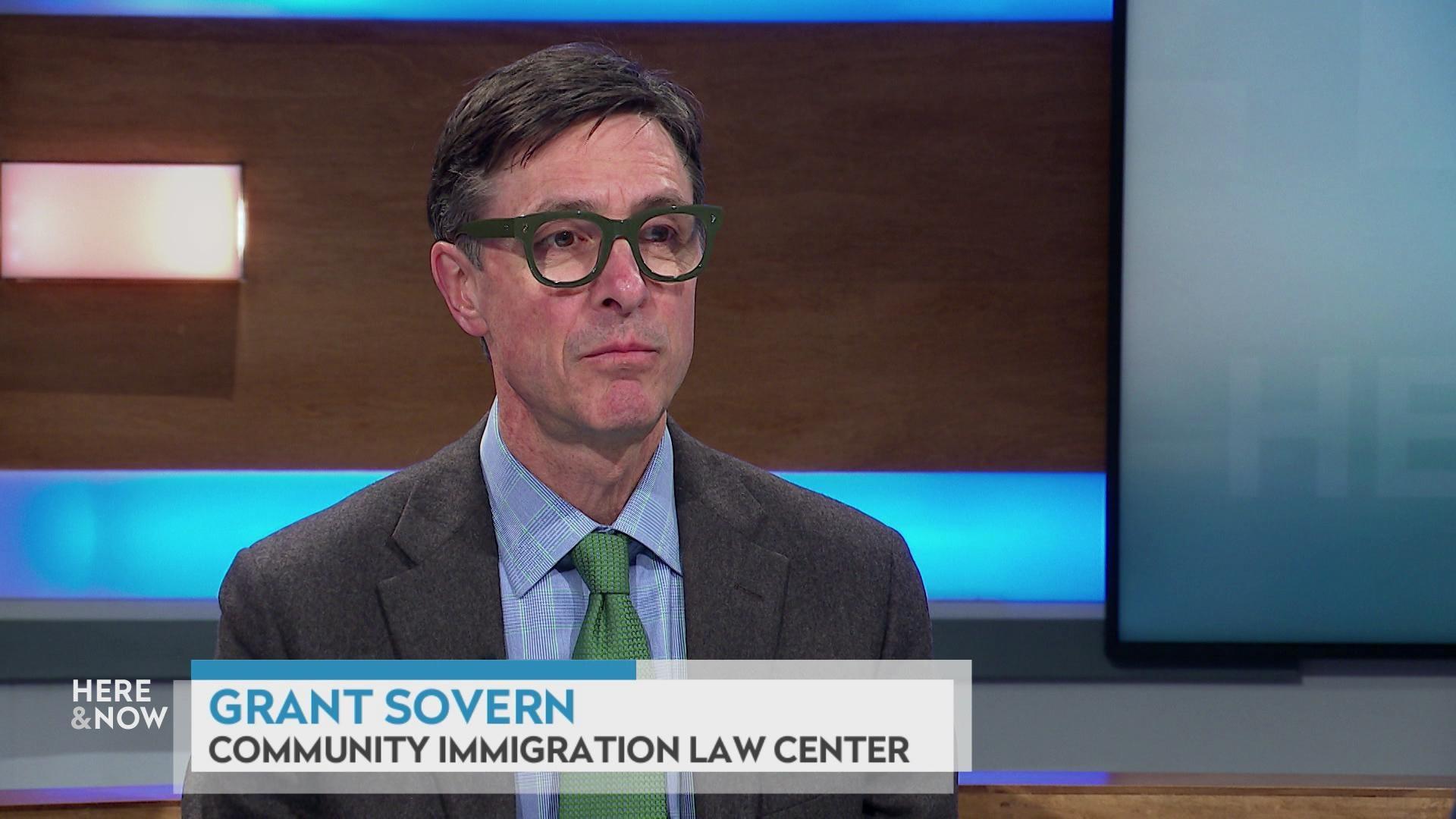In fight over voter rolls, Wisconsin appeals judges disagree on access to sensitive data
An unusual split in two of the state's Court of Appeals districts over access to information about people who have been adjudicated as incompetent to vote highlights growing partisan division in the judiciary.
Wisconsin Watch
February 7, 2024

The Wisconsin Court of Appeals reached different conclusions on two almost identical cases involving records of sensitive health information submitted to the Wisconsin Elections Commission. That's not supposed to happen, but may be a sign of increased ideological division in Wisconsin's courts. (Credit: Jack Kelly / Wisconsin Watch)

This article was first published by Wisconsin Watch.
Conservative activists who challenged Wisconsin’s 2020 election results could gain access to sensitive health information about people judged mentally incapable of voting after one appellate court took the unusual step of contradicting a related ruling from another branch of the same court.
The rulings highlight the increasing partisanship in the state’s judiciary and could create complications for lower court judges, legal experts told Wisconsin Watch. On Jan. 31, an obscure judicial committee rejected the ruling favoring conservative activists as precedent. The committee endorsed the opposing ruling in December, something that happens in roughly one in 10 cases.
The decisions were issued in separate — but practically identical — cases from the Madison-based 4th District Court of Appeals and the Waukesha-based 2nd District Court of Appeals. The Court of Appeals is the second tier of the Wisconsin court system, wedged between county circuit courts and the state Supreme Court.
The Court of Appeals hears far more cases than the state Supreme Court. In 2022 the appellate court heard more than 1,500 cases. The Wisconsin Supreme Court, over a similar time period, issued just 52 decisions.
Court of Appeals cases are heard in four appellate districts based on their county of origin, though published decisions from all of the districts, regardless of location, are binding statewide.
The Wisconsin Court of Appeals operates differently from federal appellate courts. At the federal level, in most cases, rulings only apply to the states included in that appellate court’s district. Rulings from the federal 7th U.S. Circuit Court of Appeals only apply to Wisconsin, Illinois and Indiana.
“The Wisconsin Supreme Court has said that only it has the power to overrule, modify or withdraw language from a published Court of Appeals opinion,” said Bryna Godar, a staff attorney at University of Wisconsin Law School’s State Democracy Research Initiative. “The Court of Appeals really isn’t supposed to ever overrule its own precedent.”
The conflicting rulings stem from lawsuits filed by a conservative group seeking information about Wisconsinites who have been deemed by a court to be incapable of voting. The group, Wisconsin Voter Alliance, filed lawsuits seeking the information in 13 counties.
In both cases, circuit court judges in Juneau and Walworth counties dismissed requests from WVA to require county officials to provide the group with certain completed forms related to adjudicated incompetent voters. The group appealed both cases — one to the 4th District based in liberal Madison and one to the 2nd District based in conservative Waukesha County.
The 4th District Court of Appeals upheld the Juneau County ruling on Nov. 9, finding that WVA does not have a “clear legal right” to obtain the information because the forms are “pertinent to the finding of incompetency” and, therefore, closed records under state law. The Madison-based court also declined on a technicality to discuss whether WVA demonstrated a “need” to access the information.
The court’s publication committee published the decision on Dec. 21, making it legal precedent in Wisconsin.
However, in a 2-1 decision on Dec. 27, the 2nd District reversed the Walworth County ruling, concluding seemingly the opposite — that WVA did have a “clear legal right” to the records because “access to public records is a vital and integral factor of Wisconsin’s avowed presumption towards open government.” The majority also found that WVA demonstrated a “need for the information.”
“Here, WVA asserts it has an interest in seeing that the voter rolls in Wisconsin are accurate so that our elections comport with constitutional guarantees (of fair elections),” wrote Judge Maria Lazar in an opinion joined by Judge Shelley Grogan. “If maintaining accurate voter lists — as statutorily required by the Legislature — is not a sufficient need, we are hard-pressed to articulate another.”
Lazar and Grogan insisted in a footnote that “at no point is the unified voice of this court fractured by this opinion.” Both judges declined an interview request for this story. Judge Lisa Neubauer wrote in a dissent that her conservative colleagues disregarded “this court’s obligation to adhere to prior precedent.”
- 2nd District Court of Appeals Judge Maria Lazar authored an opinion overturning a lower court’s ruling that court records indicating whether someone is adjudicated incompetent to vote are closed to the public. The opinion contradicted a 4th District Court of Appeals ruling in a similar case. (Credit: Courtesy of Wisconsin Court of Appeals)
- 2nd District Court of Appeals Judge Shelley Grogan joined an opinion stating the public can access court records indicating whether someone is adjudicated incompetent to vote. (Credit: Courtesy of Wisconsin Court of Appeals)
Legal experts told Wisconsin Watch the two rulings are clearly contradictory. Accordingly, the Walworth County judge, David Paulson, now must determine if he should follow the precedent authored by the 4th District or abide by the order issued by the 2nd District in the appeal of the case he is overseeing. Paulson did not respond to an interview request.
The court’s publication committee declined on Jan. 31 to publish the District 2 opinion. That means that the ruling is not precedential in Wisconsin courts, though the ruling is still binding in the Walworth County case.
Walworth County appealed the District 2 decision to the Wisconsin Supreme Court on Jan. 26, which could settle the matter. But the legal experts told Wisconsin Watch the conflicting opinions among appellate districts also highlight the growing partisanship among Wisconsin judges.
Questionable math
The conflicting rulings stem from a WVA effort to audit the state’s voter list.
WVA is led by Ron Heuer, a conservative activist who worked on former Wisconsin Supreme Court Justice Michael Gableman’s review of the state’s 2020 presidential election, which cost taxpayers $2.5 million and uncovered no evidence of widespread problems with the 2020 election. In 2022, Heuer wrote to the state’s more than 1,800 clerks, warning them that Wisconsin has some 15,000 to 20,000 people under a court-ordered guardianship, but fewer than 1,200 are listed in the state’s voter roll file as incompetent.
Heuer concluded the true number of incompetent voters is underreported and therefore the whole system is vulnerable to “elder voting abuse.” But the information he cited was misleading. Heuer told Wisconsin Watch WVA is evaluating the Walworth County appeal.
The voter roll data file is a continuously updated public record with voter names and addresses that anyone can obtain for $12,500. (In December, Democratic Gov. Tony Evers vetoed GOP legislation that would have reduced that fee to $250.) Heuer obtained a version of the file with about 1,200 names and addresses of voters listed as “ineligible” and the reason “incompetent.”
When Heuer broke down the list by county, he found several counties had zero ineligible voters listed as incompetent. When he shared that information with county court officials, several told him that there were far more people adjudicated incompetent to vote in their county than were listed in the Wisconsin Elections Commission database.
He then requested guardianship numbers in each county between 2016 and 2021. Based on responses from about a third of the state’s district courts — and using a per capita projection — he came up with the 15,000 to 20,000 estimate.
However, the numbers Heuer used include everyone placed under a guardianship — even though, as the District 2 appellate judges noted in their opinion, not all of them have lost their right to vote.
Others placed under a guardianship are deceased, and some may never have been registered to vote — so they wouldn’t appear in the public voter roll file. And some people placed under a guardianship and deemed ineligible years ago may have had their right to vote restored.
However, some adjudicated incompetent individuals have voted in past elections. At the request of Wisconsin Watch, Dane County conducted a review of its adjudicated incompetent information and found about 100 examples of people voting over the past decade. A review of statewide records would likely turn up hundreds more.

Ron Heuer, president of the Wisconsin Voter Alliance, spoke at a Sept. 29, 2022, Thomas More Society fundraiser in Okauchee about his efforts to investigate the 2020 election. He is leading the group’s investigation into alleged “elder voting abuse.” (Credit: Matthew DeFour / Wisconsin Watch)
In 2022, WEC changed its voter file records so ineligible adjudicated incompetent voters are no longer labeled “incompetent.” The agency separately keeps incompetent voter data in a non-public file that is accessible to local clerks, who must review it periodically to update the registration status of voters.
WEC spokesperson Riley Vetterkind told Wisconsin Watch the commission “inventoried” the written notices of incompetency it has received from county registers in probate. He said the records do not indicate whether an individual adjudicated incompetent is or ever has been registered to vote. Commission staff contacted the registers “to help update or fill in any missing information on the notices so they can be more accurately compared with voter information,” he said.
WEC staff also contacted municipal clerks to inform them of any potential living voters in their area whose information matches the information of an individual named in a notice sent to the WEC, Vetterkind said.
“Municipal clerks are responsible for activating or deactivating voter records,” Vetterkind said.
He said clerks can use the information and investigate further whether someone in their community has been adjudicated incompetent and deactivate their voter registration if necessary.
Vetterkind also noted that “a change in state law is required to allow the Wisconsin Elections Commission and other state and local partners to find a long-term solution to ensure information about individuals adjudicated incompetent is adequately shared and acted upon.
“Put simply, there is no statutory basis for centrally compiling adjudicated incompetent records.”
A bill that would change how adjudicated incompetent voters are tracked in Wisconsin has passed the Assembly and is awaiting a floor vote in the state Senate. The bill would require courts to notify the elections commission via email when someone is adjudicated incompetent. The commission would then be required to mark the voter ineligible on the official voter registration list and notify the voter and the voter’s municipal clerk of the change.
Heuer sought to reconstruct that list using “notice of voting eligibility” forms, which a court sends to the elections commission after a judge determines someone is incapable of voting. Whether those forms are “pertinent to the (court’s) finding of incompetency,” and therefore not subject to a records request, became the subject of WVA’s two appeals, which eventually led to the legal conflict.
Sign of partisan divide
Godar and Marquette University Law School Professor Chad Oldfather said it’s uncommon for two Court of Appeals districts to reach opposite conclusions in effectively identical cases.
There have been instances where one appeals court panel sought to distinguish the findings of another, Godar said, but usually on minor points that didn’t substantially change the rulings.
While the judges in the 2nd District Court of Appeals claimed to be answering different questions than their colleagues in Madison, the practical effects of the two rulings were contradictory, Godar and Oldfather said.
“I don’t think the majority opinion (in District 2) saying that it is deciding different issues is entirely persuasive,” Godar said in an interview with Wisconsin Watch. “Although it does analyze some different issues than (the 4th District case), it also reached some conclusions that were directly contrary to issues decided in (the 4th District case).”

Attorney Bryna Godar said the Wisconsin Court of Appeals isn’t supposed to overturn its own precedent. (Credit: Nick Wilkes)
The 2nd District’s efforts to distinguish its opinion from that of the 4th District offers no guidance to the county officials on how to respond to WVA’s records request, Oldfather noted.
“It’s hard to know what you would do with this situation if you were in another county seeking to figure out what to do here,” he said.
The competing rulings highlight the growing partisanship in Wisconsin’s judicial system. Previous partisan flare-ups have mostly been seen in and around the Wisconsin Supreme Court — where a record amount of money was spent on an election in 2023 to change the makeup of the court and the justices have lobbed personal attacks at one another in opinions.
But appellate court races have begun to draw notable spending, particularly in the Grogan and Lazar races, the two judges who ruled in favor of the Wisconsin Voter Alliance.
The Republican State Leadership Committee – Judicial Fairness Initiative spent at least $56,000 to help Grogan get elected in 2021, according to an analysis by the Wisconsin Democracy Campaign, a nonprofit that tracks spending in Wisconsin elections.
In 2022, a group with ties to GOP mega donor Richard Uihlein spent $425,000 to help Lazar win her seat, according to another WDC analysis. Both Grogan and Lazar defeated Evers appointees in those races.
Neubauer, who dissented in the 2nd District case, ran for Wisconsin Supreme Court in 2019, losing to Brian Hagedorn, now a swing justice on the court. Outside liberal groups spent $2.9 million on her behalf compared with $1.7 million for Hagedorn.
“This is just another indication of the extent of the polarization, not only in the state, but that’s now sort of filtering down from the Supreme Court into the Courts of Appeals,” Oldfather said. “It’s very much the case that you can look at these decisions and say, ‘Well, no surprise, the perceived ideology of the judges and the perceived ideology of their votes line up pretty well.'”
The trend “encourages shopping for the right court,” a maneuver that makes sense for litigants but “doesn’t exactly help foster the perceived legitimacy of the court system,” Oldfather added.
Additional conflicting appeals court rulings could lead to complications for county-level judges, Godar said.
“If you have conflicting decisions from different courts of appeals panels it really creates a workability problem for what the lower courts should be doing,” Godar said. “There’s also increased importance in election cases, for consistency, because they have the potential to change how our democracy works.”
The nonprofit Wisconsin Watch collaborates with WPR, PBS Wisconsin, other news media and the University of Wisconsin-Madison School of Journalism and Mass Communication. All works created, published, posted or disseminated by Wisconsin Watch do not necessarily reflect the views or opinions of UW-Madison or any of its affiliates.
 Passport
Passport













Follow Us